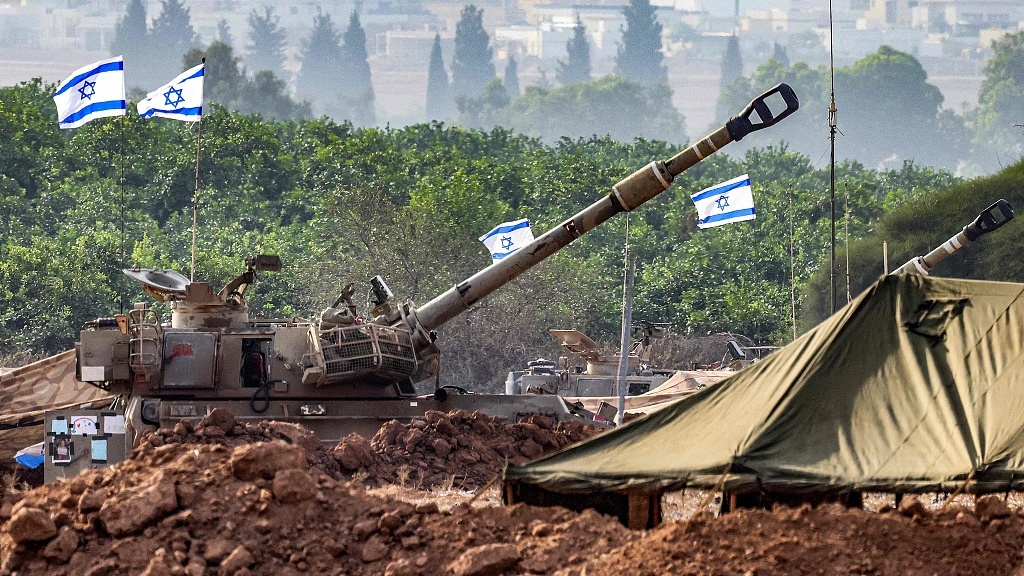
An Israeli army M109 155mm self-propelled howitzer is deployed at a position along the border with the Gaza Strip near Sderot in southern Israel on October 27, 2023. /CFP
An Israeli army M109 155mm self-propelled howitzer is deployed at a position along the border with the Gaza Strip near Sderot in southern Israel on October 27, 2023. /CFP
Nearly three weeks after Palestinian militant group Hamas executed its premeditated surprise attack on Israel, the Israeli government is edging closer to launching a full-scale ground offensive into the Gaza Strip, a territory ruled by Hamas. However, Israeli leaders are beset by a number of tough questions as they prepare for the impending operation.
One of the major concerns for Israel is the over 220 hostages taken by Hamas during its unprecedented incursion on October 7, Yu Guoqing, a research fellow at the Institute of West Asian and African Studies at Chinese Academy of Social Sciences, told CGTN. "It will be very difficult to guarantee their safety, which is also one of the primary reasons for the ground operation's delay."
Adding to the uncertainties around the fate of these hostages is Hamas' willingness to release many of them. So far, the group has freed four female captives, but this came as a result of mediation efforts by Qatar and Egypt. Israeli media reported on Wednesday that more might follow in the coming days, but such releases might pause - or worse - once the Israeli military initiates its invasion into Gaza.
The imminent ground operation, which will come almost as a certainty, is expected to far surpass the two prior invasions of Gaza in both the scale and intensity, with Israeli officials vowing to dismantle Hamas' infrastructure and "wipe it off the Earth."
It will also be preceded by Israel's most devastating aerial assault on Gaza, which has already killed over 7,000 people, most of them civilians. But once Israeli forces move into the Palestinian enclave, an even steeper spike in civilian casualties is expected.
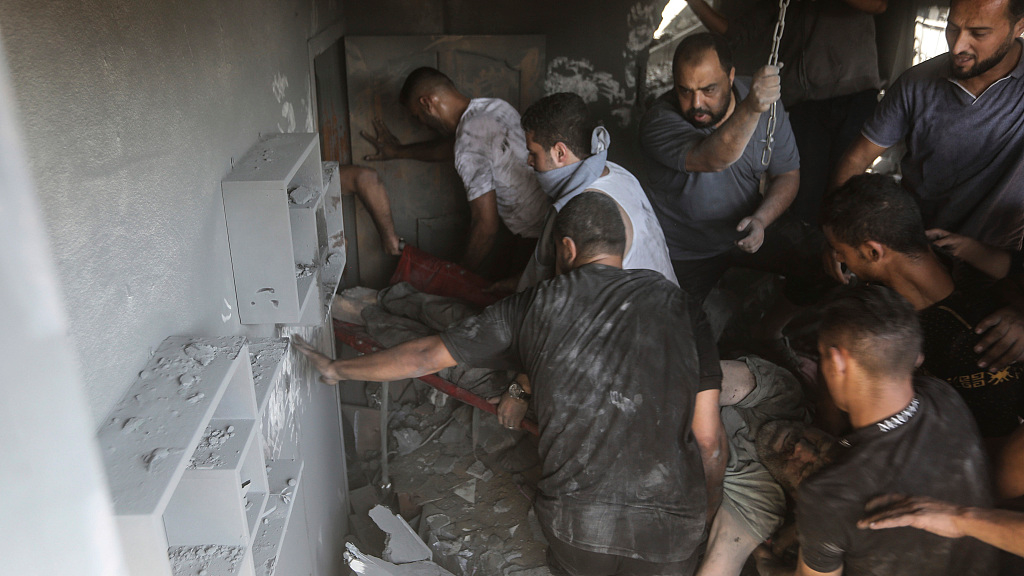
Palestinians pull a victim from under the rubble of building that were destroyed during Israeli air strike in Gaza, October 23, 2023. /CFP
Palestinians pull a victim from under the rubble of building that were destroyed during Israeli air strike in Gaza, October 23, 2023. /CFP
"Massive casualties following a ground incursion will leave a permanent stain on Israel, whose international image can only be reshaped by administrations in future generations," Yu said.
Israel has so far enjoyed the support of its Western allies, with the U.S., the UK and France having strengthened their naval presence in the eastern Mediterranean to serve as a deterrent. But in order for Israel to maintain such support and coordination, it will need to minimize civilian casualties, Nimrod Goren, a senior fellow for Israeli affairs at the Middle East Institute, a think tank based in Washington, D.C., told CGTN.
He added that the reaction from "regional and non-Western countries will likely be critical, but for some of them - the goal of toppling Hamas is a desired one."
Hamas' attack, which had a main objective of disrupting Israel's improving relations with the Arab world, has brought the Palestinian issue into the global spotlight and effectively derailed a prospective normalization deal between Israel and Saudi Arabia. The forthcoming incursion into Gaza might further impede progress in that direction, as the killing of Palestinian civilians in the strip makes the idea of removing Hamas less attractive for regional powers.
"In practical terms the (Israeli) military planners have to look for ways where they try to minimize civilian casualties," Yezid Sayigh, a senior fellow for the impact of war at the Malcolm H. Kerr Carnegie Middle East Center in Beirut, told CGTN. "That's normally the case in urban combat."
But if Israel wants to achieve any of its gains, it will have to advance deeper into the territory where there is a higher density of civilian population, and that's going to cause many casualties, he pointed out.
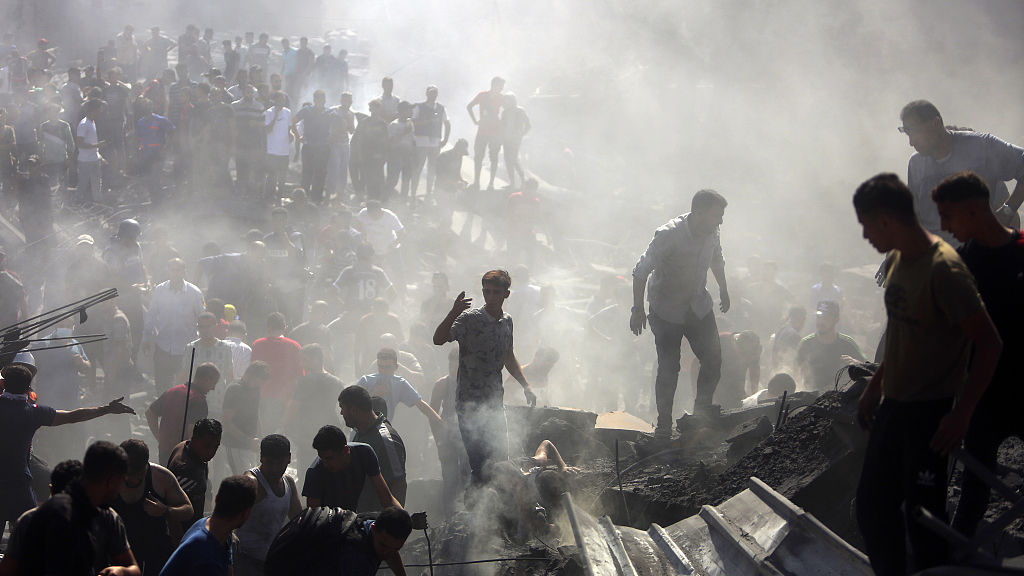
Palestinians inspect the rubble of destroyed buildings following Israeli airstrikes on the town of Khan Younis, southern Gaza Strip, October 26, 2023. /CFP
Palestinians inspect the rubble of destroyed buildings following Israeli airstrikes on the town of Khan Younis, southern Gaza Strip, October 26, 2023. /CFP
Another paradox for Israel, whose troops will have to venture into a narrow urban strip, is that the more military forces it sends in, the more targets it will have left exposed to Hamas fighters.
Israel could easily lose dozens of its soldiers in one attack if Hamas carries out a successful ambush or it manages to hit a concentration of Israeli troops with rocket strikes, Sayigh said, adding that such scenarios might fuel domestic opposition to the offensive.
A lesson not lost on Israel is the unanticipated repercussions observed during the Battle for Mosul, an operation launched by Iraq with the backing of the U.S.-led coalition forces to reclaim the city from ISIS. Although the offensive was successful in military terms, it took three times as long to complete as expected and resulted in the loss of over 10,000 civilian lives.
Various aspects of the Mosul battle offer a cautionary tale for Israel. The army will have to ask itself the realistic question of how long it needs to take to achieve a complete victory. "It's hard to answer this question," Zaki Shalom, a senior fellow for Israel's defense policy at Institute for National Security Studies, a think tank based in Tel Aviv, told CGTN.
"Hamas demonstrates a remarkable ability to perform relatively well under circumstances where Israel enjoys significant military superiority," said Shalom. "Once Israeli forces invade Gaza, Hamas will have no choice but to fight with all its power."
Hamas, with an armed force numbering up to as many as 40,000 men, has built up a diverse arsenal over the years. It has obtained heavy weapons from across the Middle East, and possesses a variety of locally made, improvised explosives. Western analysts say it is equipped with an armory, including drones and grenade launchers, sufficient to endure an incursion for a long period.
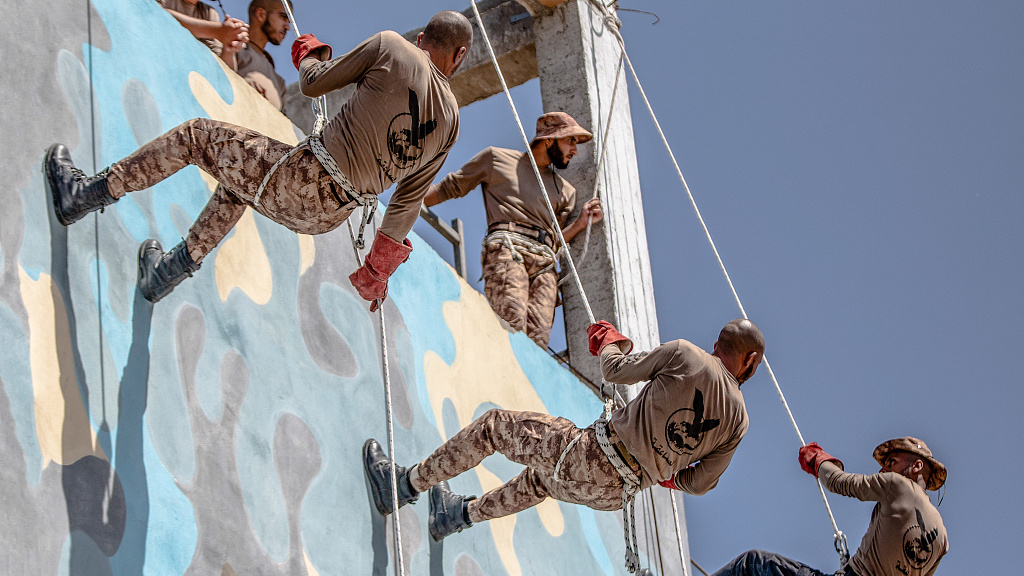
Palestinian students from the Palestinian security forces affiliated with Hamas, display their military capabilities at the Rabat University College of Law and Police Sciences in Khan Yunis in the southern Gaza Strip, September 11, 2022. /CFP
Palestinian students from the Palestinian security forces affiliated with Hamas, display their military capabilities at the Rabat University College of Law and Police Sciences in Khan Yunis in the southern Gaza Strip, September 11, 2022. /CFP
In addition to a readiness to fight, the Palestinian group has constructed a network of underground tunnels that it claims spans about 500 kilometers, nearly 13 times the length of Gaza. These tunnels, versatile for a variety of combat purposes, serve as an edge in asymmetric warfare that considerably diminishes Israel's military superiority. They also assist Hamas in gradually eroding Israel's way of war and undermining the morale of its troops.
Facing what defense officials call one of the five most serious threats to the state, the Israeli military has introduced new techniques and specialized units as part of its hefty investment in tunnel operations. Meanwhile, other preparations are being made as Israel maps out its impending operation. According to Sayigh, the ongoing bombing of civilian areas may be partly designed to destroy buildings so as to create a layer of rubble that prevents the use of tunnels by Hamas fighters.
These air bombardments will also facilitate the movement of Israeli troops into Gaza, he said, adding that the map illustrating the destruction of entire neighborhoods may suggest the intended lines of advance for Israeli forces.
The Israeli military, confident in its preparedness for a ground offensive, had urged the government to make a prompt decision, The Times of Israel reported on Monday. However, the Israeli political leadership has reportedly decided to hold off on the operation, in response to a request from the U.S.
The continued delay makes sense, as persistent airstrikes not only cause a devastating effect on morale in Gaza but also limit the amount of time Hamas fighters can remain in underground hideouts, Shalom noted.
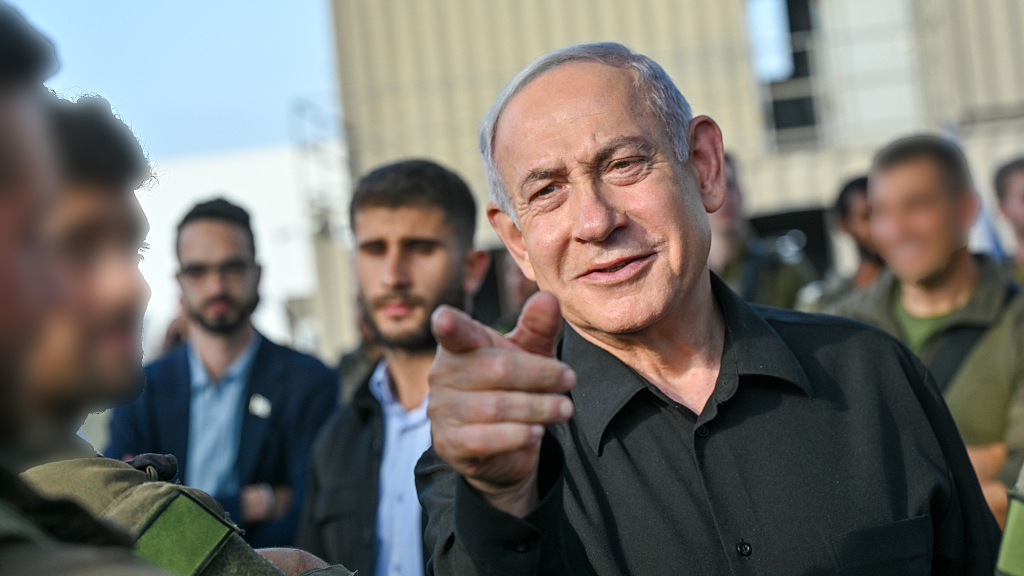
Israeli Prime Minister Benjamin Netanyhau visits Yahalom unit - a Sayeret (special operations forces) unit of the Israeli Combat Engineering Corps of the Israel Defense Forces, October 24, 2023. /CFP
Israeli Prime Minister Benjamin Netanyhau visits Yahalom unit - a Sayeret (special operations forces) unit of the Israeli Combat Engineering Corps of the Israel Defense Forces, October 24, 2023. /CFP
What also serves as a main cause for the delay appears to be the absence of a clear political goal. Sayigh said despite the official pledge to seek Hamas' annihilation, a rhetoric designed for public consumption, the Israeli political leadership doesn't have a plan for what comes after.
It is believed that Israel is not interested in ruling Gaza, having disengaged from the enclave in 2005, and if Israel doesn't stay after a military victory, it is more than likely to leave a vacuum where Hamas reemerges or groups with even more radical backgrounds come to power.
One preferred scenario is to have the Palestinian Authority (PA) resume responsibility over Gaza, Yu said. But that's neither a decision welcomed by Gazans nor something desired by Fatah, the PA's ruling party.
"If you are a military planner to plan for a battle when your political leadership doesn't have an answer for what comes after, it means you don't know whether to plan for a small operation or to plan for a big operation, but in that case you would have to know what you are going to do after you win," Sayigh explained.
The final question for Israeli leaders is the potential involvement of Hezbollah, which has already engaged in daily clashes with Israeli troops near Lebanon's southern border. While the Iran-funded militant group has integrated into the Lebanese political system, suggesting a reluctance to provoke an Israeli retaliation, it ultimately answers to its Iranian patrons.
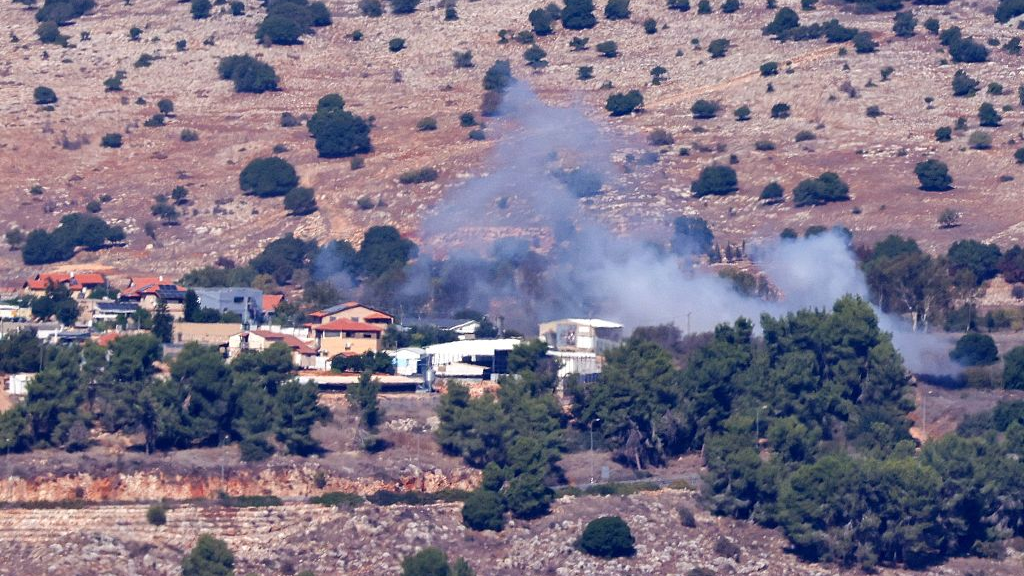
An Israeli army M109 155mm self-propelled howitzer is deployed at a position along the border with the Gaza Strip near Sderot in southern Israel on October 27, 2023. /CFP
An Israeli army M109 155mm self-propelled howitzer is deployed at a position along the border with the Gaza Strip near Sderot in southern Israel on October 27, 2023. /CFP
Middle Eastern experts are divided over the possibility of Hezbollah's full entry into the conflict. Some suggest that it might come to Hamas' rescue as it increasingly faces the danger of being eradicated. Others say Iran might not want to lose Hezbollah as a high-valued regional asset, a potential outcome if the group goes to war with Israel.
"The U.S. and others are conveying to Hezbollah and Iran clear messages that they should prevent the expansion of the war, as if this happens - it will not only broaden conflict with Israel, but may lead to active involvement of other countries as well," Goren said.
Nevertheless, the risk exists.
There remains the possibility, said Shalom, that the growing casualties resulting from Israel's ground operation in Gaza, coupled with the risk of Hezbollah opening a second front as well as increasing pressure from the U.S., will eventually compel Israeli Prime Minister Benjamin Netanyahu to accept a compromise for ending the war — a prospect he now refuses to entertain.